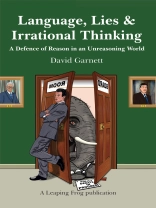- Why do we make bad decisions?
- How do people justify bad arguments?
- Is being sincere the same thing as being authentic?
- What is common sense?
- What is the link between ideology and delusion?
- Is populist rhetoric undermining democracy?
- What is the difference between strategic thinking and strategic planning?
- What is a ‘sustainable decision’?
- What is Multiple Rationality Analysis and its role in decision making?
- Are we living in an Age of Hypocrisy? If so, what can be done about?
The language used to advocate or criticise political and social policies has become aggressive and less amenable to rational debate. The ways in which we talk to each other are resulting in irrational decisions and unsustainable policies. This book examines the ways in which different, often competing, rationalities are expressed in policy debates. It is a series of essays about communication and miscommunication.
Although much of the argument is inevitably (and unapologetically) grounded in theory, its intention is to provide a way of responding to a key practical issue – namely, how to make policy decisions that we do not live to regret.
Tabela de Conteúdo
Preface and Introduction
Chapter 1: The Nature and Scope of Discourse
Chapter 2: The Tyranny of Common Sense
Chapter 3: Ambiguity
Chapter 4: Ideology
Chapter 5: Warranted Assertions
Chapter 6: Generative vs Competitive Discourse
Chapter 7: Making Assertions
Chapter 8: The Principled Self
Postscript is headed: Postscript with a small subhead: From Theory to Practise
Appendix 1 is headed: Shared Value
Appendix 2 is headed: Strategic Thinking
Sobre o autor
David is a retired university teacher and researcher. He lives in Monmouth with his wife Julia and their rescue dog Whipple. He has written extensively on policy and social justice and has acted as a consultant to a number of organisations in the UK and overseas. He has a wide experience of practical policy making and acted as chair of four voluntary bodies in the fields of disability, housing, and environmental protection. He recently retired (2016) as chairman of the board of Centigen FM Ltd. a rapidly expanding Facilities Management company. He is also currently acting as a strategic advisor to ND Metering Solutions, a manufacturing company based in Bradford with operating links around the world. He has contributed to the international literature on inter-generational justice. In retirement he maintains his interest in Philosophy, research and education.
He likes cricket and amuses himself by writing dreadful doggerel verse with obvious rhymes and dreadful puns.












